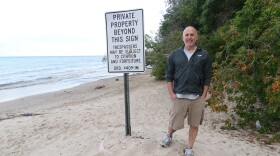-
A Madison-based environmental law firm filed an appeal to Milwaukee Circuit Court on behalf of the Shorewood resident who received a citation for walking the shoreline beyond this public beach.
-
A judge ruled Wednesday that a Shorewood man was guilty of trespassing when he walked along the Lake Michigan beyond the public beach last summer. The man says he'll appeal the decision.
-
After a decade of co-leading Milwaukee Water Commons, Brenda Coley is retiring.
-
A small stretch of Wisconsin’s Lake Michigan shoreline has been getting a lot of attention lately. But debates over private vs. public rights on the state's waterways have been going on for over a century.
-
The Wisconsin Department of Justice is about to settle a lawsuit in a PFAS contamination case in northeastern Wisconsin. Affected residents wonder if the settlement will lead to PFAS-free drinking water.
-
Wisconsin boasts about 400 miles of Lake Michigan shoreline. But a dispute in the village of Shorewood brings up an age-old question: who has access to that shoreline?
-
The Wisconsin DNR is providing bottled water to more than 1,700 households because of PFAS contamination in their drinking water. One impacted community, the Town of Campbell, has come up with its own solution.
-
Data centers are known for using huge amounts of water. Is that water usage regulated? If so, by whom?
-
Milwaukee is home to plenty of trails for biking, kayaking and hiking. But one trail sign had a WUWM listener confused: What is the Water Current Walking Tour? We’re about to find out.
-
A new report from the Alliance for the Great Lakes finds agricultural runoff is driving nitrate contamination in Wisconsin’s drinking water.
Play Live Radio
Next Up:
0:00
0:00
Available On Air Stations








